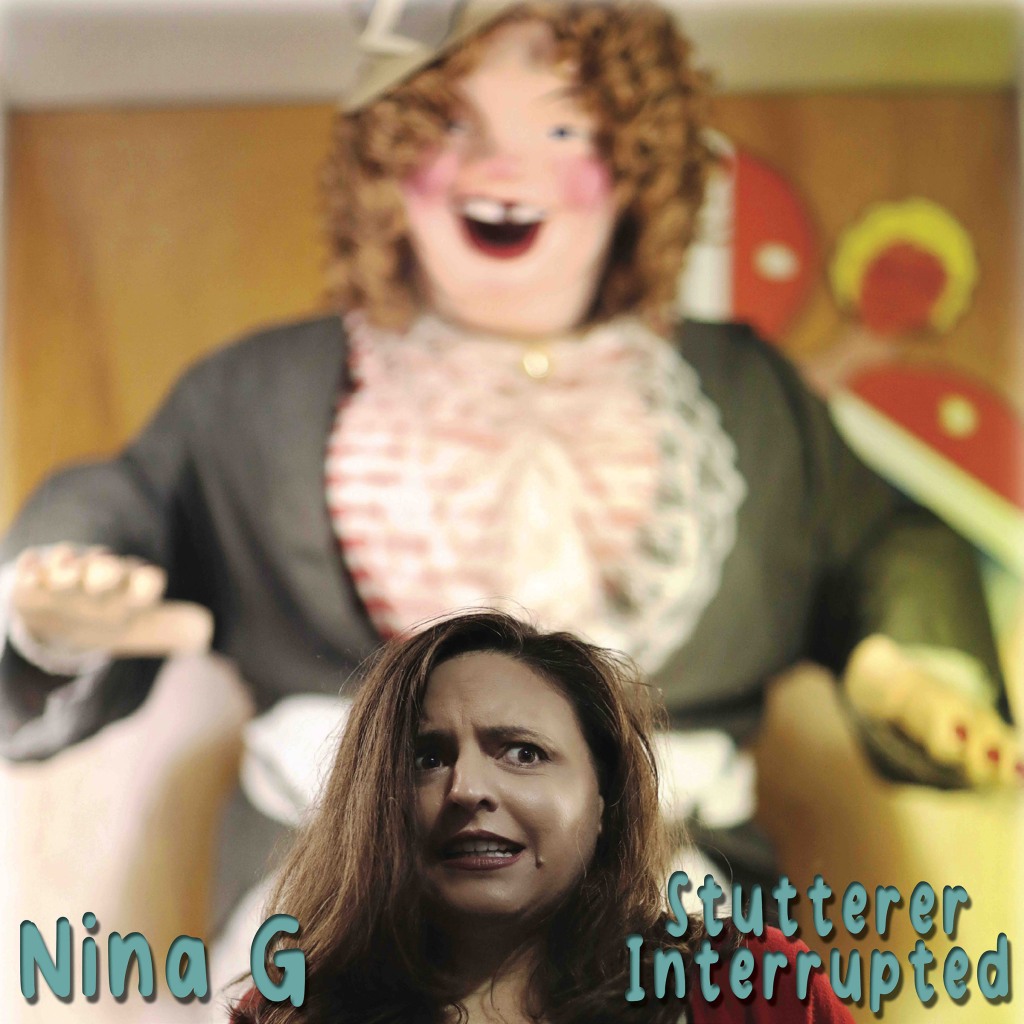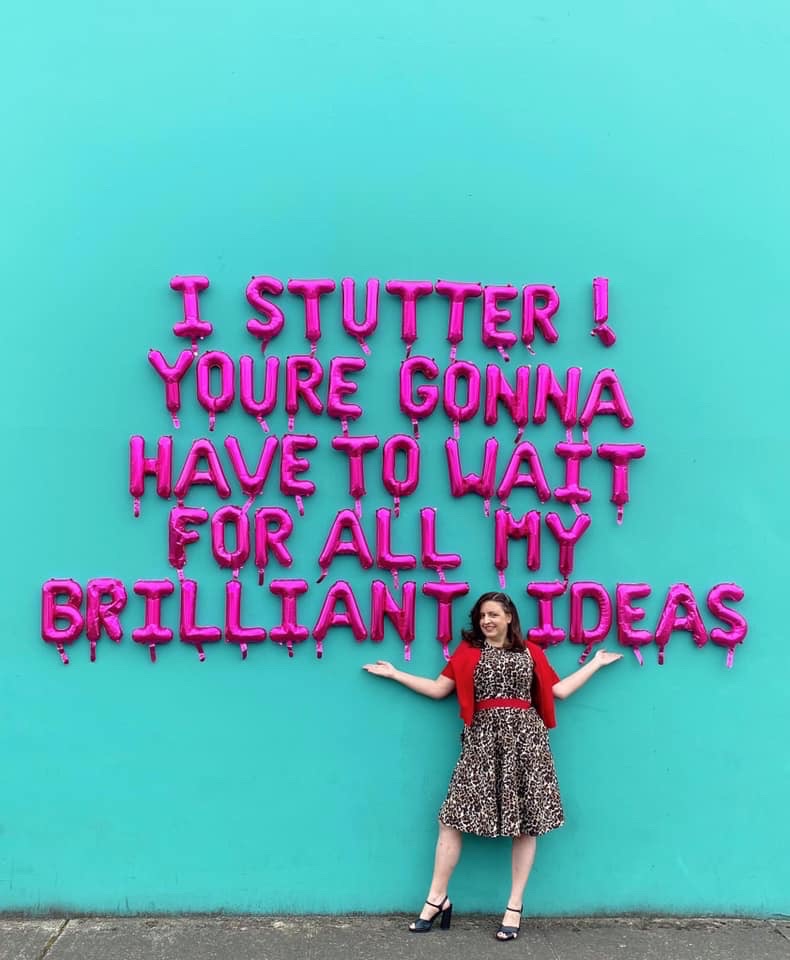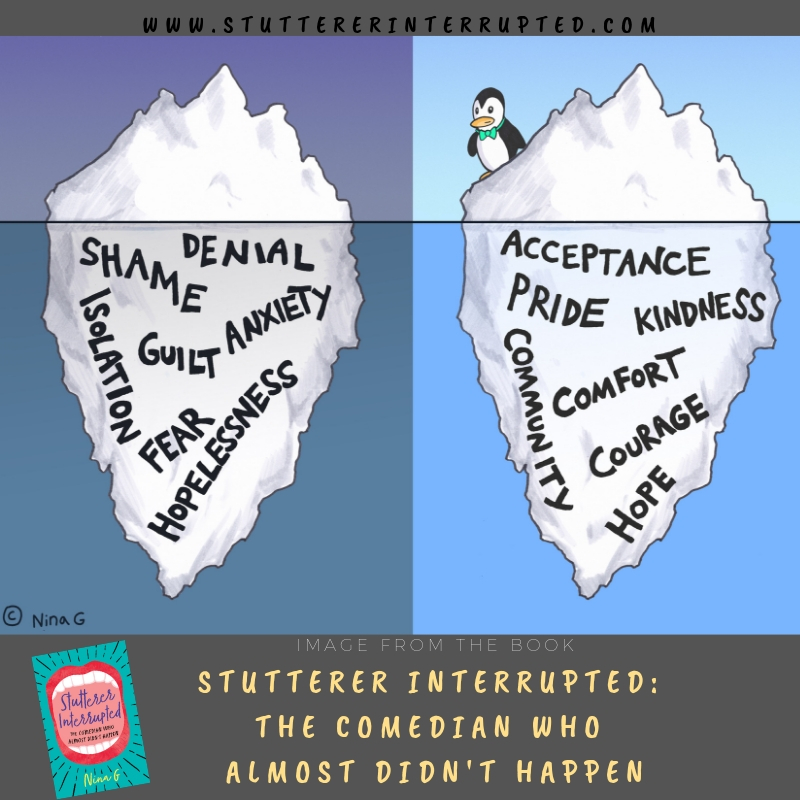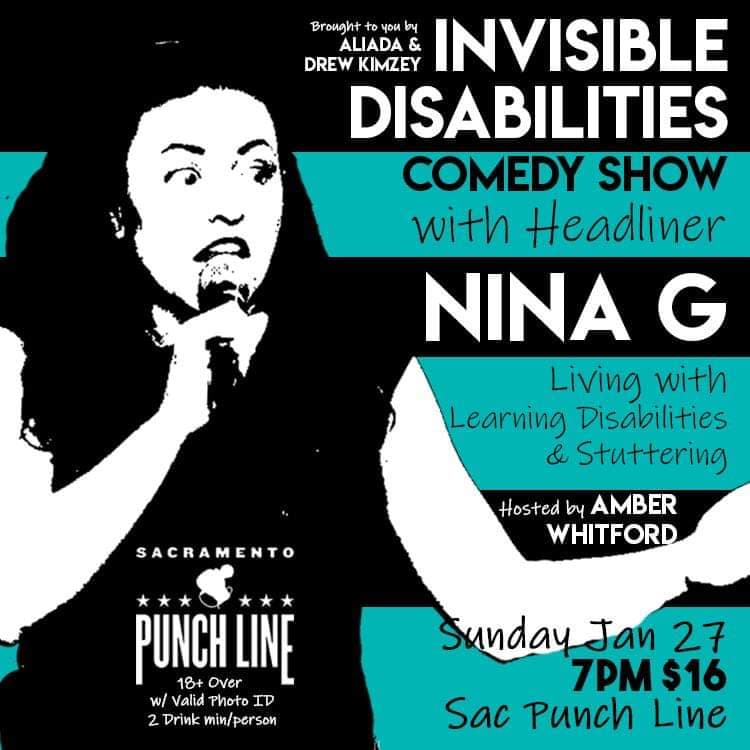Stutterer Interrupted comedy album: www.stuttererinterrupted.comFor Immediate Release
Media Contact: Nina G – https://www.stuttererinterrupted.com/copy-of-contact
April 13, 2023
Stuttering San Francisco Bay Area (Oakland) comedian Nina G.
Releases her first solo comedy album – Stutterer Interrupted – on May 11, 2023
Coinciding with National Stuttering Awareness Week: May 3-18
San Francisco, CA… Stuttering San Francisco Bay Area comedian, Nina G. announces the release of her first solo comedy album, Stutterer Interrupted (Punchline Records), with her first comedy special, to follow. Sample audio clip from comedy album. The comedy album launches May 11 and coincides with National Stuttering Awareness Week on May 8-13. Through Nina’s comedy, besides making the audience laugh, she strives to increase visibility of disabled comedians and normalize stuttering. The author of the memoir Stutterer Interrupted: The Comedian Who Almost Didn’t Happen (2019) and co-author of Bay Area Comedy: A Humorous History (2022), has made a name for herself in the San Francisco Bay Area comedy scene. SF Chronicle article, Bay Area Legacy of Laughs Enshrined in New Book Celebrating History of Local Comedy Scene. Nina, who was born in Alameda, has resided in Oakland for the past 20 years.
As I was saying… If I could get a word in edgewise… I wasn’t done yet…
If you’ve ever been cut off mid-sentence, these phrases of frustration are familiar. Now imagine as a person who stutters a lifetime of interruptions? To suffer the impatience of others, whether well-intended advice or just blatant rudeness when all you want to do is finish your thought; indeed, to finish saying even one word.
Welcome to the world of Nina G.: Professional Speaker, Stand up Comedian, Author, and person who stutters. Sounds like a joke? She’d be the first one to say it – and she has – to audiences all over the world. Her humor is one that informs and entertains. Nina’s comedy brings an authentic and unfiltered voice of the disabled experience in an industry that lacks representation for disabled comedians, especially as a woman who stutters. It’s Time for the Disabled Community to Take Center Stage. Fortune Magazine, August 2022. Nina’s new album, Stutterer Interrupted (title also shared with her memoir released in 2019), released and produced by Punchline Records, debuts May 11, 2023, just in time for National Stuttering Awareness Week.
Famous people who stutter:
•Marilyn Monroe
•President Joseph Biden
•Samuel L. Jackson
•Emily Blunt
•James Earl Jones
Some facts on stuttering:
•Stuttering impacts 1% of the adult population.
•80 million around the world stutter.
•1 in 4 people who stutter are female.
•There’s no known cure for stuttering.
•Many people who stutter experience discrimination in their jobs, personal lives, etc.
About the comedy album, Stutterer Interrupted:
Nina recorded Stutterer Interrupted in her hometown at the Alameda Comedy Club. (Nina grew up in Alameda but now lives in Oakland.) If you stutter or know someone who does, you know the reactions many people have. Nina G. has experienced EVERYTHING… from hearing back-handed compliments like, “You are such an inspiration – if I talked like you I wouldn’t talk at all!” to funny looks and inquiries about whether she has considered intrusive brain surgery. People often interrupt, thinking it’s helpful to guess what she is going to say. But it isn’t just the interruptions from others that created a barrier for this comedian. Through stand up comedy, stuttering comedian Nina G. challenges the status quo of how people who stutter are perceived onstage and off. Of course, her material isn’t all about stuttering! She takes on body image issues, family dynamics and even her last gynecological visit.
About Punchline Records:
Founded in 2022 by Matthew Layne after working as A&R for other comedy record labels, Punchline Records was built with the intent of finding undiscovered comedians, raising the industry standard record deal to be more equitable for talent, and lobbying a legislative amendment to fix the royalty system for comedy. Layne adds “One of the reasons I started Punchline Records was to help amplify comedic voices that may have otherwise been marginalized. Funny is funny. Nina G is one of the funniest: stuttering or not.”
About Nina’s comedy special to be released later this summer:
The Bay Area’s favorite female stuttering stand up comedian, Nina G, takes on the hilarious world of stuttering, family, body issues, and much more. Award-winning filmmaker (and fellow stutterer) Gina Chin-Davis captures a behind-the-scenes glimpse into Nina G’s show at the Alameda Comedy Club and the recording of her comedy album Stutterer Interrupted for Punchline Records.
About Nina G… the Comedian:
Nina G. was the only woman who stuttered in the stand up comedy world in 2010 when she started performing. (Since then there are now 3 others.) She co-produces the Comedians with Disabilities Act, a national touring comedy show featuring exclusively comedians with disabilities. She also went on to produce the first compilation album to feature, as the album title suggests, Disabled Comedy Only.
Nina G. is a the author of three books including Stutterer Interrupted: The Comedian Who Almost Didn’t Happen and Bay Area Stand-Up Comedy: A Humorous History. She has been featured in/on everything from NPR’s 51%, BBC’s Ouch, Psychology Today, Tedx, KQED Radio and multiple day time talk shows and podcasts. She has shared the stage with legendary comedians like Don Novello (aka Father Guido Sarducci), Mort Sahl, Eddie Pepitone, Cathy Ladman, and participated for 3 continuous years at San Francisco’s Comedy Day. Her first solo album debuts May 11 with a comedy special to follow later this summer. The special is directed by Gina Chin-Davis, a woman who also stutters. It not only includes concert footage but also intertwines Nina’s personal, family and educational experiences that first brought her to love stand up comedy as a child and to eventually get up on stage.
About Nina G… the Author:
Nina G’s first book, Once Upon An Accommodation: A Book About Learning Disabilities, helps both children and adults understand how to advocate for needed school-related accommodations. The book is inspired from her own childhood experience of having learning disabilities, stuttering, and being denied accommodations in her own education. Nina’s follow up was her memoir titled Stutterer Interrupted: The Comedian Who Almost Didn’t Happen which chronicles what audiences don’t get to see on stage. It is the background of what drove her to the stage and to stutter openly. Her third book, Bay Area Comedy: A Humorous History, co-written with OJ Patterson, honors the develop of influential stand up comedians who emerged from the Bay Area comedy scene including Mort Sahl, Robin Williams, Don Novello, Paula Poundstone, Ali Wong, and W. Kamau Bell.
About Nina G, the Professional Speaker:
Nina G. tours the country as a conference keynote speaker. In addition to her TedX talk at San Jose State University, she has presented for colleges, corporations and conferences all around the world including the Oregon Association on Higher Education and Disability, The International Stuttering Association, and numerous corporate/employee affinity group events.
Nina G is celebrating National Stuttering Awareness Week (May 8-13) through her comedy at the following shows:
Wed May 3 @ 7:30pm: Proud Stutter Presents Stuttering Spoken Word Night. Manny’s, 3092 16th St., San Francisco 94110. Nina will be joined by poets Adam Giannelli and Zainab Hussain, comedian Will Travis, and podcaster Maya Chupkov). www.proudstutter.com/events/stuttering-spoken-word
Sat May 6 @ 6pm: Comedians with Disabilities Act Show. Greater Purpose Brewing, 21517 E Cliff Dr., Santa Cruz, CA (Nina will be joined by fellow stuttering comedian Will Travis along with comedians Mean Dave, Dan Smith, and Steven Danner). www.eventbrite.com/e/greater-purpose-comedy-comedians-with-disabilities-act-tickets-614341591237
Thursday, May 11 @ 7pm: Comedians with Disabilities Act Show. Alameda Comedy Club, 2431 Central Ave., Alameda, CA (Nina will be joined by fellow stuttering comedian Will Travis, along with comedians Mean Dave, Loren Kraut, and Steven Danner) www.alamedacomedy.com/shows/213711
Saturday, May 13 @ 7pm: Cougars on the Loose. Tabard Theater Company, 29 N San Pedro St., San Jose, CA. (Nina headlines two shows.) Cougarcomedycollective.com/upcoming-shows
Thursday, May 18 @ 7pm: Lockdown Comedy (on Zoom). Along with Dhaya Lakshminarayan, Nick Leonard, and Arline and Lisa Geduldig. CityBoxOffice.com/LockdownComedy
Thursday, May 18 @ 7:30pm: Marga Gomez and Brava Present Who’s Your Mami Comedy. Brava Theater Center, 2773 24th St, San Francisco, CA. www.margagomez.com/events/2023/3/16/giioxoyyksypaw05sax52ag9ao8mol
To book Nina G., visit: www.ninagcomedian.com









